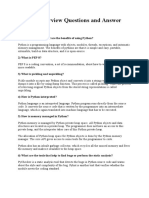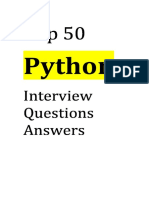0 ratings0% found this document useful (0 votes)
6 viewsPython_Interview_Questions
The document lists 100 interview questions focused on Python programming, covering key features, memory management, data types, and differences between Python versions. It also addresses advanced topics such as decorators, APIs, web scraping, and machine learning frameworks. This comprehensive set of questions is designed to assess a candidate's knowledge and skills in Python.
Uploaded by
atalparkecCopyright
© © All Rights Reserved
We take content rights seriously. If you suspect this is your content, claim it here.
Available Formats
Download as PDF, TXT or read online on Scribd
0 ratings0% found this document useful (0 votes)
6 viewsPython_Interview_Questions
The document lists 100 interview questions focused on Python programming, covering key features, memory management, data types, and differences between Python versions. It also addresses advanced topics such as decorators, APIs, web scraping, and machine learning frameworks. This comprehensive set of questions is designed to assess a candidate's knowledge and skills in Python.
Uploaded by
atalparkecCopyright
© © All Rights Reserved
We take content rights seriously. If you suspect this is your content, claim it here.
Available Formats
Download as PDF, TXT or read online on Scribd
You are on page 1/ 4
100 Python Interview Questions
1. What are Python's key features?
2. What is the difference between deep copy and shallow copy?
3. Explain Python's memory management.
4. What is PEP 8, and why is it important?
5. What are Python's built-in data types?
6. Explain the difference between lists and tuples.
7. What is the difference between Python 2 and Python 3?
8. How does Python handle memory allocation?
9. What is the difference between mutable and immutable types?
10. Explain the use of *args and **kwargs in Python.
11. What is the difference between a shallow copy and a deep copy?
12. How does Python's garbage collector work?
13. What are Python's built-in functions?
14. How do you handle exceptions in Python?
15. What is the difference between a module and a package?
16. How does Python implement multi-threading?
17. What is a lambda function in Python?
18. What are list comprehensions?
19. Explain the difference between is and == in Python.
20. How do you open and read a file in Python?
21. How do you write data to a file in Python?
22. What are Python's built-in set methods?
23. Explain Python's dictionary and its methods.
24. How do you remove duplicates from a list in Python?
25. What is the difference between append() and extend() in lists?
26. What is the difference between range() and xrange()?
27. How do you implement a stack in Python?
28. How do you implement a queue in Python?
29. What is the difference between Python's list and array?
30. How does Python handle memory leaks?
31. What are Python's string methods?
32. How do you check if a string contains a substring?
33. How do you convert a string to a list in Python?
34. What are Python's regular expressions?
35. How do you use the re module in Python?
36. Explain the use of map(), filter(), and reduce() in Python.
37. What is the difference between static and instance methods?
38. How do you create a class in Python?
39. What is the difference between class and instance variables?
40. How do you implement inheritance in Python?
41. What is method overriding in Python?
42. What is method overloading in Python?
43. What are Python's magic methods?
44. What is the __init__ method in Python?
45. What is the difference between @staticmethod and @classmethod?
46. What is a generator in Python?
47. What is the yield keyword in Python?
48. How do you handle database connections in Python?
49. How do you execute an SQL query in Python?
50. What is Flask, and how is it used?
51. What is Django, and how is it different from Flask?
52. How do you create an API in Python?
53. What is a virtual environment in Python?
54. How do you install third-party libraries in Python?
55. What is unit testing in Python?
56. How do you write a test case in Python?
57. How do you debug a Python program?
58. What are Python's logging methods?
59. What is the difference between synchronous and asynchronous programming?
60. How do you implement multithreading in Python?
61. How do you implement multiprocessing in Python?
62. What are Python's built-in decorators?
63. How do you create a custom decorator in Python?
64. What is the difference between GET and POST requests?
65. How do you send HTTP requests in Python?
66. What is a REST API?
67. How do you parse JSON data in Python?
68. How do you handle XML data in Python?
69. What is Web Scraping, and how do you do it in Python?
70. What is the BeautifulSoup library used for?
71. What is Selenium, and how is it used in Python?
72. What is the difference between a compiled and an interpreted language?
73. What is Python's Global Interpreter Lock (GIL)?
74. What is the purpose of the with statement in Python?
75. How do you handle large datasets in Python?
76. What are Pandas and NumPy used for?
77. How do you create a Pandas DataFrame?
78. What are Python's built-in list sorting methods?
79. How do you perform binary search in Python?
80. How do you implement a linked list in Python?
81. What is an iterator in Python?
82. What is a coroutine in Python?
83. How do you measure execution time in Python?
84. How do you profile a Python program?
85. How do you manage dependencies in Python projects?
86. How do you implement caching in Python?
87. What is memoization in Python?
88. How do you implement a priority queue in Python?
89. What is the difference between a binary tree and a binary search tree?
90. How do you perform graph traversal in Python?
91. How do you use Python's collections module?
92. How do you handle circular imports in Python?
93. What is dependency injection in Python?
94. How do you implement design patterns in Python?
95. What is monkey patching in Python?
96. How do you use Python for machine learning?
97. What are TensorFlow and PyTorch used for?
98. How do you deploy a Python web application?
99. What is Docker, and how is it used with Python?
100. How do you secure a Python web application?
You might also like
- 300 Python Interview Questions and Solutions100% (1)300 Python Interview Questions and Solutions88 pages
- Intel® Realsense™ SDK 2016 R2 Reference Manual: Api Version 10.0No ratings yetIntel® Realsense™ SDK 2016 R2 Reference Manual: Api Version 10.0587 pages
- Checkpoint HealthCheck-Audit Checklist Ver 1 0100% (1)Checkpoint HealthCheck-Audit Checklist Ver 1 01 page
- Python Interview Pro 200 Interview Questions Basic to Advance Level Suri pdf download100% (2)Python Interview Pro 200 Interview Questions Basic to Advance Level Suri pdf download74 pages
- Beginner – Technical Questions & AnswersNo ratings yetBeginner – Technical Questions & Answers8 pages
- Top 25 Python Programming Viva QuestionsNo ratings yetTop 25 Python Programming Viva Questions4 pages
- Python Interview Questions Answers Free PDFNo ratings yetPython Interview Questions Answers Free PDF16 pages
- Driver - Configuration - Support - Guide - Edition 7 PDFNo ratings yetDriver - Configuration - Support - Guide - Edition 7 PDF32 pages
- Minor Project Report - 7TH SEMESTER - OdtNo ratings yetMinor Project Report - 7TH SEMESTER - Odt16 pages
- Iot Based Energy Monitoring and Management System For Smart HomeNo ratings yetIot Based Energy Monitoring and Management System For Smart Home17 pages
- ICT Grade 10 Practice Question Paper MCQ Term 2 Chapter 20 SpreadsheetNo ratings yetICT Grade 10 Practice Question Paper MCQ Term 2 Chapter 20 Spreadsheet7 pages
- YARVIK XENTA 9.7 - TAB09-211 - Manual - MultilingualNo ratings yetYARVIK XENTA 9.7 - TAB09-211 - Manual - Multilingual452 pages
- Smart Metering Program: Utility Case Study - BC Hydro Smart MetersNo ratings yetSmart Metering Program: Utility Case Study - BC Hydro Smart Meters13 pages
- The Human-Computer Interaction Handbook FundamentalNo ratings yetThe Human-Computer Interaction Handbook Fundamental4 pages
- S3032 Advanced Scenegraph Rendering Pipeline PDFNo ratings yetS3032 Advanced Scenegraph Rendering Pipeline PDF42 pages





























































































